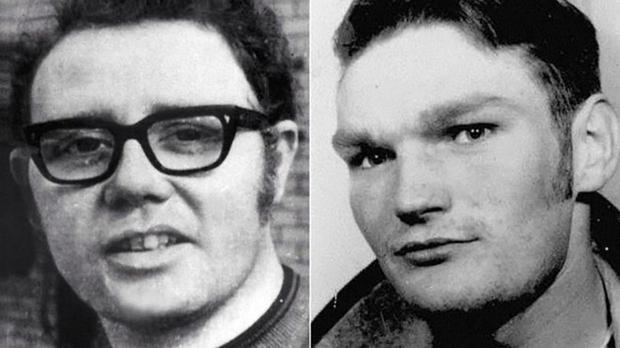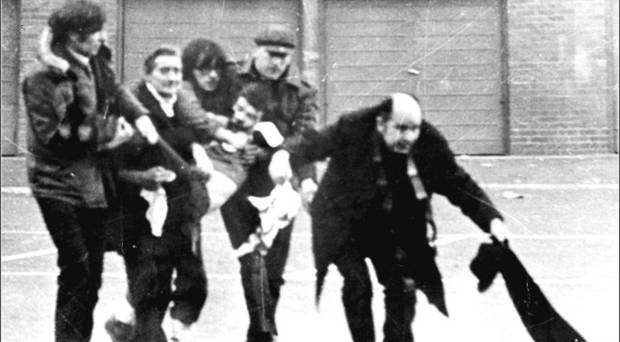
Soldier F was charged with the murder of William McKinney (left) and James Wray on Bloody Sunday
Soldier F was accused of murdering James Wray and William McKinney on January 30 1972, when troops opened fire on civil rights demonstrators in the Bogside area of Londonderry, killing 13 people.
The ex-paratrooper was also accused of the attempted murders of Patrick O’Donnell, Joseph Friel, Joe Mahon and Michael Quinn.
He faced a seventh supporting charge of the attempted murder of a person or persons unknown on the day.
The PPS reviewed a number of cases involving British soldiers in light of a recent court ruling that caused the collapse of another Troubles murder trial involving two military veterans.
There had been concerns the cases were in jeopardy following the collapse of a separate case against two soldiers accused of the murder of former Official IRA leader Joe McCann earlier this year.
McCann, 24, was shot in disputed circumstances at Joy Street in the Markets area of Belfast in April 1972.
Soldiers A and C, both in their 70s, had pleaded not guilty. The men admitted firing shots but said they had acted lawfully when doing so.
Both soldiers were interviewed by a police legacy unit, the Historical Enquiries Team In May of this year a judge ruled that evidence as inadmissible and the Public Prosecution Service (PPS) said it would not appeal against that decision, meaning the case could not proceed.
The ruling had cast doubt on all remaining military prosecutions.
Ciaran Shiels of Madden and Finucane solicitors, who represents the Bloody Sunday families, said they intend to challenge the decision.
“We have informed the Public Prosecution Service of our intention to seek an immediate judicial review of its decision to discontinue the prosecution of Soldier F.
“The reasons underpinning the PPS decision relate to the admissibility of statements made to the Royal Military Police (RMP) in 1972 by a number of soldiers who were witnesses to events in Glenfada Park.
“The admissibility of RMP statements in relation to the events of Bloody Sunday is a matter already under active consideration by the High Court, which will hear detailed legal argument over five days in September.
“In those circumstances, the decision by the PPS to halt this prosecution is clearly premature in the absence of a High Court ruling on the issue”.
A statement from the families added: “Anyone who suggests that Soldier F has somehow been vindicated, or cleared in relation to his actions on Bloody Sunday by today’s decision must engage with the known facts.

Bishop Edward Daly on Bloody Sunday in January 1972
Adding that that he shot “William McKinney and Jim Wray as they ran from Glenfada Park seeking the safety of Abbey Park and wounded four others.
“He shot Paddy Doherty, a 31 years old father of six children from behind, as he crawled to safety in the area of the Rossville Flats.
“As Paddy lay dying, Bernard McGuigan, a 41-years-old father of six went to his aid waving a white handkerchief. Soldier F reacted to this remarkable act of bravery and humanity by shooting Mr McGuigan through the back of his head, the bullet exiting through his eye.
“These are incontrovertible facts. Soldier F did not mount any legal challenge to these findings of the international Tribunal of Inquiry, which was the Bloody Sunday Inquiry”.
“Soldier F finds himself in this position today where this prosecution is to be halted, benefitting from an appalling and unlawful agreement which existed between the Chief Constable of the RUC and the General Officer in Command of the British Army which precluded police from interviewing murder suspects under caution.
“Various courts have been scathing of this agreement and the manner in which it offended the rule of law.
“It is now being relied upon to shield British soldiers from prosecution for the murders of unarmed civilians.”
Tags:




